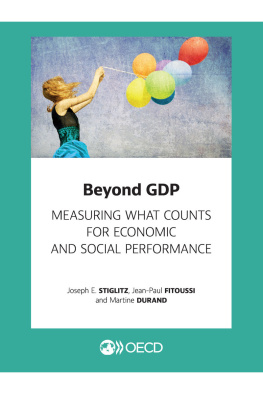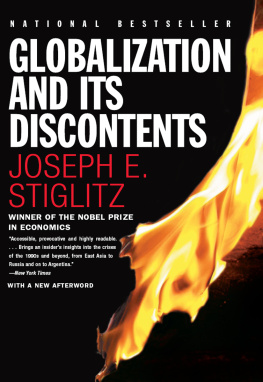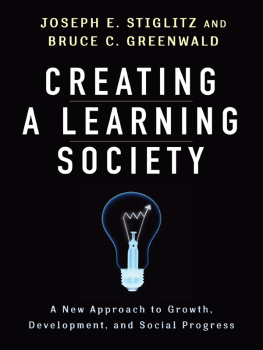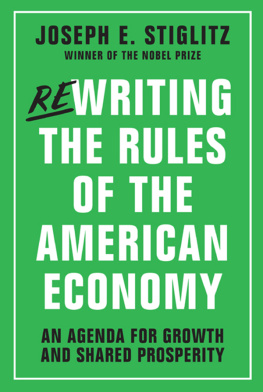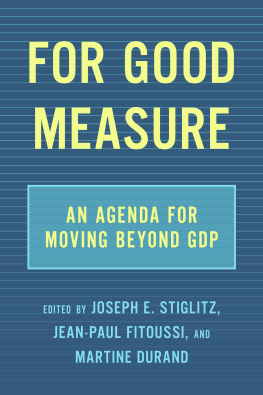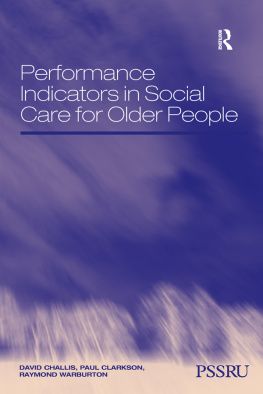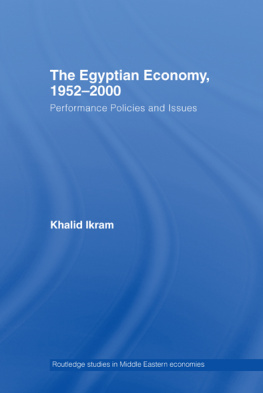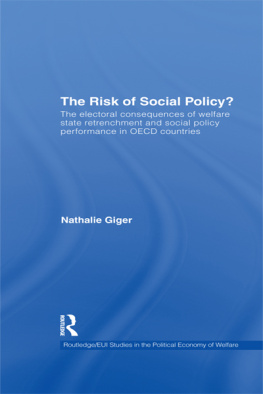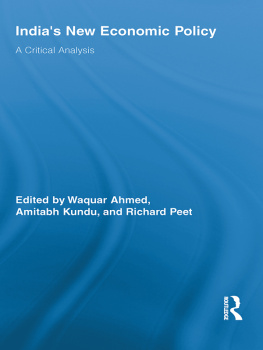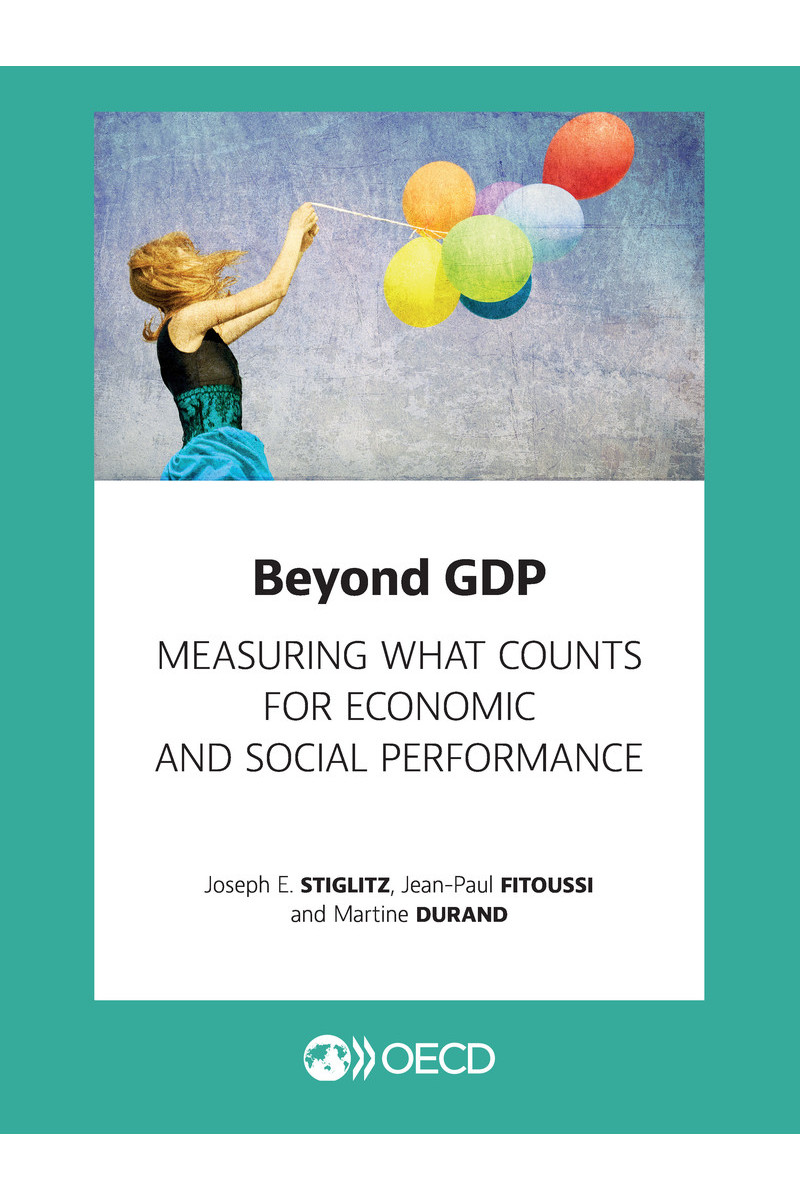Beyond GDP Measuring What Counts for Economic and Social Performance
Please cite this publication as:
Stiglitz, J., J. Fitoussi and M. Durand (2018), Beyond GDP: Measuring What Counts for Economic and Social Performance , OECD Publishing, Paris.
https://doi.org/10.1787/9789264307292-en
Metadata, Legal and Rights
ISBN: 978-92-64-30728-5 (print) - 978-92-64-30729-2 (pdf) - 978-92-64-30917-3 (HTML) - 978-92-64-30916-6 (epub)
DOI: https://doi.org/10.1787/9789264307292-en
This work is published under the responsibility of the Secretary-General of the OECD. The opinions expressed and arguments employed herein do not necessarily reflect the official views of OECD member countries.
This document, as well as any data and any map included herein, are without prejudice to the status of or sovereignty over any territory, to the delimitation of international frontiers and boundaries and to the name of any territory, city or area.
The statistical data for Israel are supplied by and under the responsibility of the relevant Israeli authorities. The use of such data by the OECD is without prejudice to the status of the Golan Heights, East Jerusalem and Israeli settlements in the West Bank under the terms of international law.
Photo credits:
Corrigenda to OECD publications may be found on line at: www.oecd.org/publishing/corrigenda .
OECD 2018
You can copy, download or print OECD content for your own use, and you can include excerpts from OECD publications, databases and multimedia products in your own documents, presentations, blogs, websites and teaching materials, provided that suitable acknowledgement of OECD as source and copyright owner is given. All requests for public or commercial use and translation rights should be submitted to .
Preface
This short book provides our personal perspective, as Chairs of the OECD-hosted High-Level Group on the Measurement of Economic Performance and Social Progress (HLEG), on the most salient issues discussed by the Group over the past five years (from 2013 to 2018). Over this period, the HLEG periodically convened to discuss many of the issues that are reflected in this book. The HLEG, whose members are listed in below, was created to pursue the work of the Commission on the Measurement of Economic Performance and Social Progress convened by former French President Nicolas Sarkozy in 2008 (the Stiglitz-Sen-Fitoussi Commission). A companion report, For Good Measure: Advancing Research on Well-being Metrics Beyond GDP, provides a series of authored chapters, prepared by some HLEG members, on those topics that have been the focus of the HLEG work, and which are also discussed here.
While this book presents our own perspective on the deliberations of the HLEG, it rests on the enormous contributions of its members; not just the authored chapters in the companion report but the extensive discussions and deliberations, both in our plenary meetings and in the thematic workshops. Full credit needs to be given to the HLEG members for their huge intellectual contributions, which are reshaping how we think about the measurement of economic performance and social progress.
Any Group of this kind, dealing with complex and important issues, faces an insoluble dilemma. To get agreement among all HLEG members on all the salient issues is extraordinarily difficult and time consuming. As we undertook this new phase of the work, with greater constraints and higher ambitions, the Group decided to have authored chapters on each of the topics upon which it would focus with the hope that each of these chapters would take into account the deliberations and comments of other HLEG members.
At the same time, we believed it important to provide an overview of the issues that we discussed. The Group therefore agreed that there would be a Chairs summary, reflecting and taking into account the views of all members of the HLEG. It was understood that not every member would agree with each of our interpretations of the issues. Some members might not even agree that we have captured accurately the spirit of our deliberations though, based on the feedback we have received from members, we are confident that we have been able to strike a good balance.
We feel remiss that we have not been able to give individual credit to each of the ideas that each HLEG member has contributed. They have been selfless in their dedication to this project, and we are deeply grateful. All we can say is thank you.
Our thanks also go to the OECD, for having hosted the work of the HLEG during this 5-year period, to the many foundations and organisations who hosted and financially supported the organisation of the thematic workshops, and to the many researchers who attended these workshops and shared with us their expertise on these subjects. These workshops have focused on:
Intra-generational and Inter-generational Sustainability (22-23 September 2014), Rome, hosted by the Einaudi Institute for Economics and Finance and the Bank of Italy and sponsored by SAS;
Multi-dimensional Subjective Well-being (30-31 October 2014), Turin, organised in collaboration with the International Herbert A. Simon Society and Collegio Carlo Alberto, and with the support of Compagnia di San Paolo;
Inequality of Opportunity (14 January 2015), Paris, hosted by the Gulbenkian Foundation in collaboration with Sciences-Po Paris and the CEPREMAP;
Measuring Inequalities of Income and Wealth (15-16 September 2015), Berlin, organised in collaboration with Bertelsmann Stiftung;
Measurement of Well-being and Development in Africa (12-14 November 2015), Durban, South Africa, organised in collaboration with the Government of South Africa, the Japanese International Cooperation Agency, Columbia University and Cornell University;
Measuring Economic, Social and Environmental Resilience (25-26 November 2015), Rome, hosted by the Einaudi Institute for Economics and Finance, supported by the Bank of Italy and Istat, and sponsored by SAS;
Economic Insecurity: Forging an Agenda for Measurement and Analysis (4 March 2016), New York, organised in collaboration with the Washington Center for Equitable Growth, the Yale Institution for Social and Policy Studies, and the Ford Foundation; and
Measuring Trust and Social Capital (10 June 2016), Paris, organised in collaboration with Science-Po Paris and the European Research Council.
We would like to express our special thanks to a number of colleagues who have supported our work throughout this period: Marco Mira dErcole, for his many valuable inputs to this book; Elizabeth Beasley, for acting as rapporteur of the authored volume; Martine Zada, for co-ordinating the HLEG and organising all the thematic workshops and plenary meetings; Patrick Love, for his inputs and for editing the books; Christine Le Thi for statistical assistance; and Anne-Lise Faron, for preparing these books for publication.
Box 1. High-Level Group on the Measurement of Economic Performance and Social Progress
Chairs
Joseph E. Stiglitz, Professor of Economics, Business and International Affairs, Columbia University
Jean-Paul Fitoussi, Professor of Economics at Sciences-Po, Paris and Luiss University, Rome
Martine Durand, Chief Statistician, OECD

